#uncaused
Text
"I Am He"
Carl Pollard
Jesus describes Himself in many ways throughout the Gospels. Each name further explains His love, care, protection, judgment, and attitude towards us. There is one name He used that caused quite an uprising in His earthly ministry. However before we dive into the New Testament, we must start at the beginning.
Exodus 3.
Here we read that Moses was shepherding his father-in-law’s…

View On WordPress
0 notes
Text
writing is so fun !! why does it suck ass n balls
#aria void#fr I feel like im smashing my head against a cheese grater most of the time#sometimes something comes through but its not pretty#if it was just like a fear of writing something bad that would be something I could learn to get over#but i don't know what's holding me back#i occasionally have spurts where I can write a bunch but they never last long#which is how I end up with 5 billion unfinished story ideas I have no clue what to do with#i try just forcing myself to write anyway but my mind just goes blank#I can half visualize where to take things but its like there's a paper jam in the path to convert that into words#idk whats causing it idk how to uncause it and its the lack of knowing what the problem is that's so fucking frustrating#i have so many fucking stories in me but the one path to shove them out is an inch wide and always clogged#insert funny shit constipation joke heha#granted i think part of its just my various undiagnosed disorders kicking in and making it impossible to concentrate#literally I was trying to write a short story just now and sorta kinda starting to get somewhere#but i got distracted by ranting about how hard writing is and now my groove is unrecoverably thrown off#fuck my stupid baka brain
5 notes
·
View notes
Text
.
#i have been…struggling struggling with my mental health recently#between uncaused anxiety and my hyper awareness flare up#mixed with the stress of finals weeks coming up#AND the fact that I barely have any money really right now#i just….#everyday kinda sucks at this point#and I just wanna hurry up and get thru it#because at this point it’s wearing down on me physically#i just need this semester and shit to be over with so I can actually be able to work thru the rest of my anxiety
0 notes
Text
filha seduziu a mae e fez sexo gostoso
Melayu gaya anjing sex
Natural big tit blonde amateur teen Zoey fucks her wet bald pussy with red dildo on the stairs for intense orgasm
First fuck of anus Dildo and Fisting for lesbian
Free party sex episodes
Babes Jennifer White and Stassi Sinclair go crazy on pussy
Busty Babe Anna Bell Peaks Sucks On Big Cock Of Boss
Teen tight ass whipped with full force
Solo masturbation with Angellina until orgasm
Nice blow job from latina
#gonopodium#bilewhit#archbishopry#antithetic#gringophobia#sheep-shearing#eartagged#uncausativeness#stooker#Gosnell#succinamate#reidentifying#cocorico#fatting#NCSL#octogynous#prompter#pentoxide#seminonflammable#repowder
0 notes
Text
“They” say that unattended cooking is the number one cause of kitchen fires, but I was standing right next to the oven when that pot full of carburetor cleaner went up in flames. Okay, not carb cleaner. I can’t afford the good stuff. It was a pot full of Pine-Sol. Okay, Columbo, it was dollar-store brand imitation Pine-Sol, which is indeed flammable.
The most important thing to do in the event of a fire is not to panic. Luckily for me, my life experience consists of dealing with many fires. Panic is actually completely impossible for me at this point, as the part of my brain that handles the adrenaline response for such a disaster is no longer responsive to stimuli. Last doctor I had was pretty sure it had just burned itself straight out from over-use, did two papers on it. She got a job at some AI-run drug company, one of the ones whose name is all consonants. Let’s get back to the fire.
I had a fire extinguisher. In my kitchen, no less. It was just attached to a big chunk of Chrysler Imperial, because it used to be part of an NHRA-standard drag racer. Those guys are sticklers about fire protection, probably because you can only watch so many up-and-coming teenagers with immense racing talent reduce themselves to barbecue before you decide it might be time to ask them to carry a fire suppression system onboard. I hit it with my adjustable wrench, which is the only thing an adjustable wrench is good for, and it goes off, blanketing the room in some horrendously caustic fire-uncausing chemical. I also sometimes use it (the wrench) to grab hot pots off the stove when I can’t find my oven mitts. Now is such a time, and I quickly throw the entire assembly out of the missing kitchen window into the snow, where it sizzles and is rendered inert.
After a few minutes to regain my composure and discover the furthest extents of man’s discoveries of new and exciting profanity, I step outside to retrieve the carburetor. Clean as a whistle. I smile, and walk back inside, ready to begin the arduous task of forming my own carburetor gaskets out of old roof shingles.
718 notes
·
View notes
Text
There is just beingness, effortless, alive, consciousness without name or form, just the vastness of uncaused love.
Tony Parsons
44 notes
·
View notes
Text
The great spiritual author Alan Watts had a wonderful image. He said when a boat goes through the water, it leaves a wake in the water as it passes through. The way we understand things psychologically would be that the wake actually creates the boat, that the past is what creates the present moment. But of course, we know that the wake isn’t creating the boat; the boat is creating the wake. It’s the present moment that is creating the past. The present moment is what’s knifing through the water and the wake is just the recording of the present moment moving farther and farther into the past.
So if you look at it from that standpoint, the past doesn’t actually create the present even though it seems like the past is what gives us our present experience, which conditions the way we see life. There’s actually another way to see it, and that’s what the spiritual orientation is. The spiritual orientation is rooted in the revelation or the perception that there’s only right here and right now. And even deeper than that is that everything you think and feel and experience right here and right now is not actually the outcome of the past. It’s actually the spontaneous bursting into existence of the present. In a way it’s uncaused.
We’re taught to view life through the orientation that the past creates the present. The “here and now” orientation doesn’t seem to make a lot of sense. And yet, not only in the realm of spirituality, but also in the realm of science and quantum mechanics, we start to see that life actually bursts forth uncaused, seemingly out of nowhere, seemingly out of nothingness. This is what some of our physics and physicists have observed, that the smallest particles of matter actually seem to burst out of nowhere, out of nothingness, and on an even more perplexing level, that our observation of life is what actually brings life into being.
This is really the deeper meaning of “spontaneous.” Spontaneity means uncaused. It’s not following the laws of causation. At the subatomic level, nothing happens until it’s observed, and as soon as something is observed, the observation itself is what brings it into being. So the observation and what is being observed actually arise spontaneously together.
This may all seem quite abstract. That’s why I like the image of a boat moving through water, because with that image you can see how it’s the present moment that’s creating the past, not the past that’s creating the present moment. Even though that may be hard to grasp, it’s really quite easy to have some rudimentary understanding of this by just imagining a boat going through the water and the simple recognition that it’s the present moment of the boat going through the water that creates the wake. The wake will be the past. That’s where the boat moved through the water, and that’s the signature of the boat moving through the water. But the past does not create the present.
From Adyashanti's True Spiritual Orientation, 2010
77 notes
·
View notes
Text
When someone takes a game too seriously, it very quickly loses its fun.
Human incarnation is like that, but worse.
The ego is an emergent self, meaning it "emerges" from a collection of things that aren't a self.
Primarily the ego exists in reference to the body-mind but it may also grow to include habits, likes, dislikes, physical appearance, language, culture, and education.
If any of those are removed or changed, you still exist. Yet the character you feel yourself to be may or may not feel different. The distinction between the feeling of existence and our felt identity is vital to understand.
The feeling of existence is awareness. Awareness knows itself; it exists and knows it exists. It is changeless and continuous.
Awareness illuminates the play of consciousness. To us, consciousness is the perpetually changing experience of a human body-mind. It is all we have known since birth. Our felt identity, the ego, emerges in the body-mind from certain collected patterns of consciousness.
A metaphor may make understanding this more intuitive and clear:
Think of awareness as electricity, consciousness as the images produced on a TV screen by means of electricity, and the ego as the character appearing on the TV screen with whose life and story we identify.
Your feeling of existence (awareness), is entirely uncaused and untouched by the appearance, changes, and disappearance of the character on the show, or even by the show itself (consciousness). Despite this, we live our lives unaware of being anything other than our character and their story.
This is the illusion. Not the show or the characters but the belief that you are the character, that your feeling of existence comes from the character. That is existential ignorance and it creates immense suffering--both for ourselves and for each other.
Three consequences arise inherent to the ego:
1. Existential dread.
We feel that our existence begins with our character's birth and ends with our character's death. Imagine if you were playing a video game and you were brainwashed to believe the same thing about your game character. Would the game be fun or would it be terrifying?
Our human life and everything we know regarding it will end. Who knows what if anything endures after death. It's fair to assume basically nothing. That's something with which we all need to come to terms. But our sense of existence, of being alive, does not end. That is a big deal and makes a big difference.
2. The sense of separation.
As we live wholly identified with that character, we take their side in all matters. It creates a sense of separateness and it is the basis for disharmony, conflict, and confusion. It is also the sense of separateness that creates the feeling that we are lacking something, that something is missing in life. This then leads to the drive described next.
3. The search for happiness.
The combination of our felt sense of separation with our belief that our existence begins and ends with our character poses a problem. It means our starting point is that of incompleteness and we have only a limited time to find completion. So we seek happiness and try to avoid suffering.
This seeking drives us even deeper into the illusory predicament. Because 99% of the time, due to our identification with the character, that seeking only ever occurs within the TV show. We try to make that character happy through the things in the TV story and avoid bad things in the story, which just tangles us deeper in the whole belief that the character story is us.
Temporary happiness or temporary relief from suffering is possible, but it is only ever a partial happiness or relief and it is never sustained indefinitely.
The good news is that there is a way to freedom.
"You are not just a meaningless fragment in an alien universe, briefly suspended between life and death, allowed a few short-lived pleasures followed by pain and ultimate annihilation." -- Eckhart Tolle
To review, we all appear as different characters and we all have the feeling of "I," the feeling of existence. That is awareness; it is the electricity underlying the whole TV show. Consciousness is the medium in which the body's senses and mind's thoughts appear. Within the display of consciousness, a derived identity forms in the mind-body shaped by our culture, language, psychological imprints, and the like, as the story plays out.
I have explained why we will never be at ease let alone truly happy so long as we live as if we are a fragment in a story beyond our control. We will be grasping at scraps of pleasure and resolving to endure innumerable hardships only to be facing inevitable obliteration at our moment of death.
When the ego's illusion is broken, the TV show is seen to be an inert play on a screen and the infinite play of awareness and consciousness stands revealed as having been there all along. That is realization, or enlightenment.
The next few points are important to understand, as they are the very reason for why I explained all of this in the first place.
1. The character, the ego, doesn't become enlightened, nor is it destroyed.
Ramana Maharshi once said that enlightenment is like the sun discovering there is no such thing as night or day. Nothing actually changes other than the arising of clarity regarding what has always been the case.
2. Freedom doesn't mean the character gets to do whatever they want.
Freedom is from the illusion of feeling yourself to be the character. This kind of freedom releases a tremendous amount of tension and fear built up within the character.
3. At the same time, the character doesn't go anywhere.
The character still participates in the TV story but now it can do so without such profound confusion and suffering. It can truly begin to have fun. Also, compassion for others spontaneously arises because there are no "others" and there are no sides.
"We're all just walking each other home." -- Ram Dass
For lack of a better term, we call this existential path of awakening "spirituality." One day, I would like to find a better word for it.
LY
#spirituality#consciousness#awareness#enlightenment#realization#self-realization#yoga#buddhism#zen#philosophy#inspo#happiness#self improvement#mindfulness#hinduism#meditation#love#inspiration#self realization
245 notes
·
View notes
Quote
Awareness is primordial; it is the original state, beginningless, endless, uncaused, unsupported, without parts, without change. Consciousness is on contact, a reflection against a surface, a state of duality. There can be no consciousness without awareness, but there can be awareness without consciousness, as in deep sleep. Awareness is absolute, consciousness is relative to its content; consciousness is always of something. Consciousness is partial and changeful, awareness is total, changeless, calm and silent. And it is the common matrix of every experience.
Nisargadatta Maharaj

34 notes
·
View notes
Text
First of all, I think everyone who predicted the 'Lu Guang alternate timeline' theory deserves a chocolate ice cream, and amazing job to the studio for embedding the story well enough that we could figure it out!
Second of all, did you all notice the difference in outfits? In the current timeline, both Lu Guang and Chang Xiaoshi are wearing costumes from the Romeo and Juliet play. However in the past timeline Lu Guang travelled away from, they were wearing their typical outfits, with Cheng Xiaoshi in the blue jacket and Lu Guang in the white overshirt.
The implication is kind of that the whole hostage situation didn't happen. Which actually, makes a lot of sense. I don't know if any of of you have heard of the bootstrap paradox, but it's a theory that when you travel in time to cause an event that correlates to your own timeline, the event is then 'uncaused'. Essentially it raises the question, Cheng Xiaoshi takes control of Lu Guang, and runs to the location he was abducted, because he was rescued by Lu Guang. And he only did this because he already had the memory of Lu Guang saving him. But who saved Cheng Xiaoshi first?
(Google Doctor Who Bootstrap Paradox, it explains it incredibly well)
So if the hostage situation didn't happen, maybe Cheng Xiaoshi died earlier in the timeline?
Also, Lu Guang was able to jump back in time, which isn't his ability. Back to the theory of parallel lines, what if in the original timeline, Cheng Xiaoshi passed Lu Guang his own ability, like how in the current one, Xixi (presumeably) passes her own to Qiao Ling. There are commonalities in the disparate timelines.
Also, the flashback with Chen Bin breaking free and catching himself has horrific implications. Because 'it can change with the influence of others' might have been Lu Guanv travelling back in time to save his friend, but Chen Bin didn't survive, his death was delayed. Time is more inevitable that one could think, and Cheng Xiaoshi has the mark of death on his life now.
86 notes
·
View notes
Text
The Fundamentalist As Liar
Earlier this year I wrote about Michael Winger, a truly awful stain of a man with a more successful Youtube channel than mine so who’s so big and smart now huh and I wrote about that man’s particular tendency to claim sight unseen the illegitimacy of positions against him. What this usually means is that he argues that Atheists aren’t really Atheists, because,
then he presents a list of unconvincing reasons and eventually cooks down to ‘they just want to sin.’ Like, one of the favourites of this position is the idea that look, all the things you want to say about the arguments that have convinced you, those things aren’t that important because they’re just a smokescreen, a rhetorical assertion that stands in place because there’s a real, simple, emotional demand: I believe this because I want to believe this.
And I think, based on experience and reading a lot of these ding dongs’ writing reaching back two centuries, that uh, that’s because that’s how their worldview works, so they assume it’s how everyone’s does.
The Fundamentalist Christian is a liar who believes everyone believes lies.
I haven’t done any kind of comprehensive study. I haven’t met every Christian Fundamentalist. What I have to offer on this is the story of my experience and also my experience of all the people I’ve met since who slotted neatly into the mental software I was already running. Software is the best comparison I can make, where the fundamentalist viewpoint is a platform that runs some pretty reliable programs on top of it. Those programs are great, and you know it’s an operating system since it can run conflicting programs alongside one another without necessarily having any kind of fault in memory handling. My point is that I can open up any apologist channel in the year of our lord 2024 and hear one of the same small pool of bullshit narratives presented with the same bullshit assumptions built into them.
When you see the arguments used over and over again, when you correct flaws in the argument, over and over again, you quickly lose the ability to imagine that these people are aware of what they’re arguing and whether or not the argument is just a cloak of words they throw over how they feel about things. There are some really egregious cases of it, such as Ken Ham and Kent Hovind, who have been making the same arguments my entire life and contend with correction by ignoring it and repeating the same script when you’re not in the room.
But there’s also the apologetics of those who want to be seen as serious or big thinkers, the kinds of nobodies who think that they have the presence and awareness to attack actual scholarship, and they dress themselves up with a sense of seriousness, a sort of vast pomp that gets really pissy when you remind them that the book they’re trying to argue is infallible has a zombie apocalypse and multiple talking animals in it. ‘Well you would bring those up,’ they sneer as if reminding them of things that are true is somehow a low blow, an unfairness in the conversation. Oh, you, you’ve shown how unsophisticated you are by pointing out a book full of obvious fictions has obvious fictions in it, and if that was all this is that would work! It is pretty dumb to treat a book of folklore as if it’s a history textbook and demand it hold to that standard!
But they usually get around to admitting they think the talking animals are real.
There’s this one that’s really famous because there’s a serious-sounding condescending prick named William Lane Craig promoting it, the ‘Kalam Cosmological Argument.’ The argument runs as follows:
Everything that exists has a cause
The universe exists
Therefore the universe has a cause
And people keep looking at this and going: Well hang on, hang on, what says the universe has a cause? what about uncaused events? What about philosophical infinities? what about- when the much simpler response is ‘that’s fucking stupid.’ Because they don’t mean ‘the universe has a cause, period,’ they mean ‘the universe has a cause,’ deep breath, then subtle mumbling, ‘and that cause is the Christian god who I personally believe in as the best explanation for everything.’
And so you have this seriousness being used to adorn and address something which is really just being used to smuggle not into the idea of an actual philosophical point but rather recentre on this person’s fanfiction interpretetation of a few divine figures in a book of folklore in which, again, there are talking animals, unicorns, a global flood and a bunch of lies about prophecy.
Oh yeah, the lies about prophecy. Man, Christians love talking about how much prophecy Jesus fulfilled. They’ll tout lists, which they then are confident you won’t look at because if you do you find they’re very unsatisfying and tend to include things that haven’t happened yet. But more damning than that is if you look at the prophecies and go back to where they say they’re from, and then ask, say, a Rabbi who speaks the language of the book, you’ll find that uh, actually, that’s not what the Bible is about.
And then they introduce the idea of dual prophecies where there’s a prophecy about this thing that happened and the Rabbi’s version of events is true and supported, and then the other version with the rewritten words is actually also about Jesus, and please ignore the way that again, they change the wording. And this is serious. This is serious adults who get mad at you for not respecting their obvious fucking scam bullshit, because they believe it.
And they probably do!
That’s one of the funniest things about liars, they tend to wind up believing their lies. Oh sure they’ll know they made things up but the lie doesn’t sit in the brain over time and eventually they rewrite it, over and over, until eventually they’re not really lying, they’re basically telling the truth, they were telling the truth, and I don’t know what you mean about rewritten words. And then they’ll remember you as being rude or hostile or sad or angry and oh look at that they don’t have to worry about whatever it was you said. This is very consistent behaviour.
You may have heard this phrase, the idea that one’s faith is being tested. This is the idea that having to confront that reality sucks is a direct contest with the faith that people embrace. ‘You just gotta believe’ and ‘fake it till you make it.’ And what do they do about it? They lie. And any time you talk to someone about this kind of testing, they’ll usually say something like ‘well everyone is tested like that,’ which nobody seems to think is a problem. Like, hey, is it that universal that everyone winds up seeing mistakes and then everyone tells themselves it’s no big deal? It has the same energy as a person asserting ‘well look I’m straight and as a straight person I’m sure we all want to kiss that person of the same gender as me, that’s obvious’ and you have to be like okay, you know what that means right?
The assertation that people know what’s wrong rather than that they’ve proven wrong is very satisfying if your entire moral framework is based around your personal disgust. This means you wind up with a social framework that doesn’t just say ‘you’re right,’ but asserts even further, you are default. Christians Fundamentalists are so used to this default status it smooths over their fucking brains. The arguments don’t need consideration they just assert themselves, and then lie to themselves afterwards about the questions.
This is why they think so many things that people can’t readily choose are choices, and then that choices that people make are illegitimate because they veer away from the default.
Every Christian chooses what parts of the Bible to ignore. Even Fundamentalists. The Christians who aren’t Fundamentalists ignore that the Fundamentalists they claim to despise are using the same book and know it better than they do. And I mean this, they all choose what to ignore. For example, one of the most bananas things I’ve ever heard from a fundamentalist is that no, slavery isn’t bad, and it’s not bad because God told them how to do it, so clearly he’s okay with it which means it doesn’t follow at all, even in the American South that slavery was bad. Which is pretty amazing to consider because that’s a guy who doesn’t choose to lie to himself about that part of the book.
(Don’t worry, he’s got other bits he’s making shit up about.)
It was a breathtaking claim. After he said it I asked him how mum was doing, and he told me she’s doing fine and he looks forward to seeing me again soon.
Been a few weeks stewing on that one.
Check it out on PRESS.exe to see it with images and links!
53 notes
·
View notes
Text
IS THE UNIVERSE A QUANTUM FLUCTUATION??
Blog#301
Wednesday, May 31st, 2023
Welcome back,
Can science figure out how the Universe came to be? The Big Bang model, as developed by George Gamow, Ralph Alpher, and Robert Herman, reconstructed the history of the Universe from about one ten-thousandth of a second after the “bang,” all the way to the formation of the first hydrogen atoms and the decoupling of photons when the Universe was about 400,000 years old. That last process gave rise to the cosmic microwave background radiation, which was discovered in 1965.
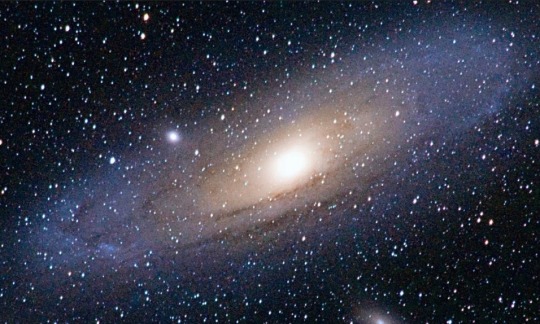
In its infancy, the Universe was filled with a primordial soup of elementary particles and radiation, all furiously colliding. This picture of the early Universe has been amazingly successful, prompting physicists to push their models as far back in time as they might reach. But how far can they reach? How close to the very origin can scientific models arrive? Could they go all the way to t = 0, the beginning of everything? Or does the notion of time passing lose its meaning as we approach the origin?
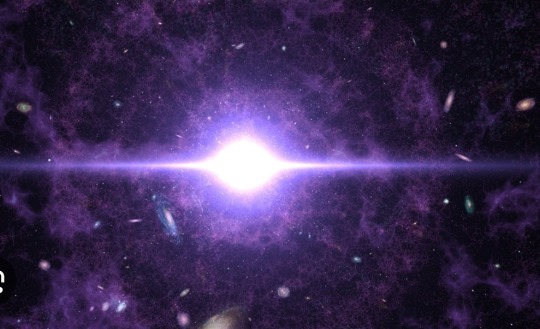
This is an old problem, one philosophy sometimes calls the First Cause. If there really is an abrupt beginning of everything, a Universe that becomes itself at some point in the past, it must be due to an uncaused cause — a cause that cannot be preceded by anything else. Any model for the origin of the Universe uses established physical laws and places them within the conceptual framework of physics. Science cannot avoid using something to describe things, and this something presumes the existence of a material substrate.
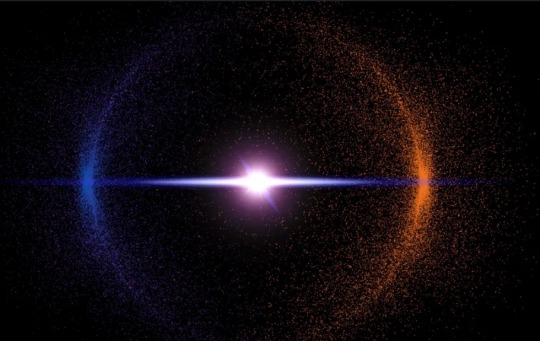
In other words, to see something hatch, we need to start with an egg, and the question is where this egg comes from. It is easy to fall into an endless regression, a problem famously expressed as “turtles all the way down.”
origin of the Universe does not address the question of why this Universe operates the way it does. Science certainly provides many answers to the workings of nature, but we should not lose sight of its limitations. The question of why there is something rather than nothing should inspire us all to humility.

Mathematically, extrapolating any of the traditional cosmological models to time t = 0 leads to what we call a singularity. Matter density becomes infinite, the curvature of spacetime becomes infinite, and the distance between any two observers goes to zero. Disturbing as this may sound, the existence of a singularity is not to be taken too seriously. It signals the breakdown of general relativity, and of physics as we know it, at the extreme conditions that prevailed during the very first moments of the Universe’s existence.
In essence, the singularity signals our ignorance of physics at these very high energy scales. Something else is needed here, and ideas abound.
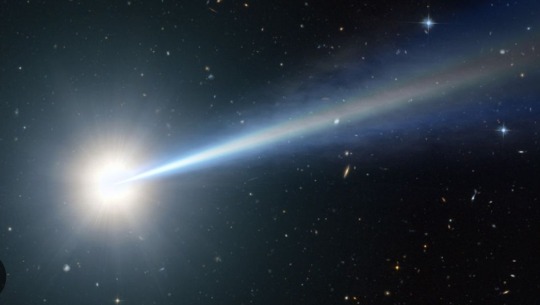
The most promising among them call for a blend of general relativity and quantum mechanics.
The most dramatic effect from quantum mechanics is an intrinsic fuzziness of matter that manifests itself at atomic and subatomic distances. Close to the Big Bang singularity, the whole geometry of the Universe is to be treated by quantum mechanics, and as such, the very concepts of space and time become blurry. It may be that quantum mechanics will blunt the sharpness of the singularity by making it fuzzy.

There have been many attempts to marry Einstein’s general relativity with quantum mechanics, but so far their promise far outpaces their success. Some of the best minds in theoretical physics are at this moment very busy trying to make this marriage work. As all authors working in this field should agree, any claim to understand physical conditions near the singularity must be met with substantial skepticism. Yet we push forward. We must try to obtain at least some information about the peculiar physics that dominated the beginnings of the Universe.
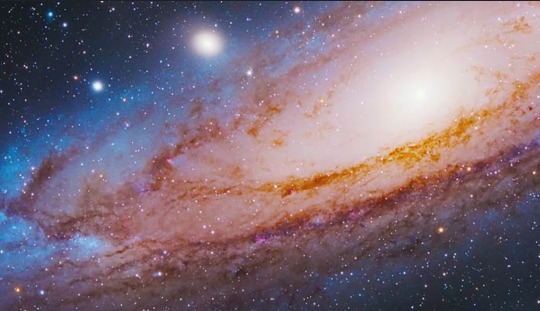
In 1973, Edward Tryon, then at Columbia University, proposed a pioneering idea of how to apply quantum mechanics to the beginning of the Universe. Tryon suggested that quantum fuzziness does not only occur when measuring positions and velocities, but also applies to measurements of energy and time. In the world of the very small, it is possible to violate the law of conservation of energy for very short times, Tryon proposed, even if the net energy of the Universe is zero.
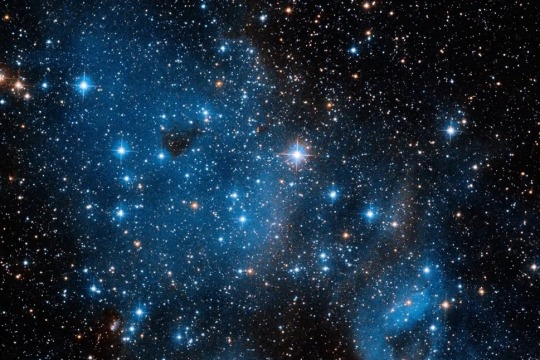
This is not as crazy as it seems. Think of a billiard ball lying quietly on the ground. If it is not moving, it has no kinetic energy. If we measure gravitational potential energy from the ground up, it also has no potential energy. The ball rests at a zero-energy state. Now turn the ball into an electron. According to Heisenberg’s uncertainty principle, we cannot localize an electron and tell its velocity simultaneously. The fuzziness inherent in the electron prohibits that.
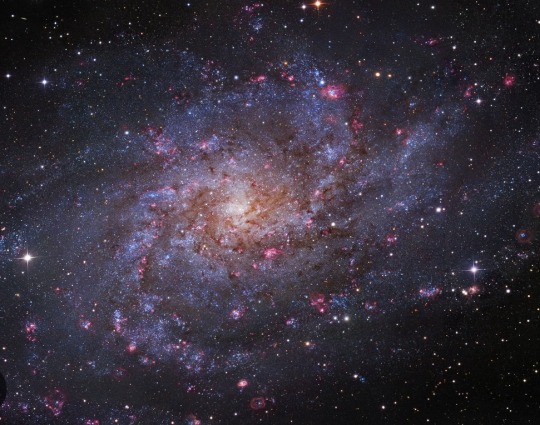
Thus, in quantum mechanics, there is no zero-energy state. There is only the lowest possible energy state of a system, its ground state. Now, if there is an inherent uncertainty in the energy of a system, then the energy of the ground state can fluctuate. If we call this ground state a quantum vacuum, it follows that the quantum vacuum always has some structure to it. There is no such thing as a true vacuum in the sense of complete emptiness. Quantum mechanics forbids nothingness.
Originally published on bigthink.com
COMING UP!!
(Saturday, June 3rd, 2023)
"DOES MASS INCREASE WHEN NEARING THE SPEED OF LIGHT??"
#astronomy#outer space#alternate universe#astrophysics#spacecraft#universe#white universe#space#parallel universe#astrophotography
82 notes
·
View notes
Text
Awareness is primordial; it is the original state, beginning-less, endless, uncaused, unsupported, without parts, without change. Consciousness is on contact, a reflection against a surface, a state of duality. There can be no consciousness without awareness, but there can be awareness without consciousness, as in deep sleep. Awareness is absolute, consciousness is relative to its content; consciousness is always of something.
11 notes
·
View notes
Photo


”The universe is uncaused, like a net of jewels in which each is only the reflection of all the others in a fantastic interrelated harmony without end.”
223 notes
·
View notes
Text
""In the beginning God." Not matter, for matter is not self-causing. It requires an antecedent cause, and God is that Cause. Not law, for law is but a name for the course which all creation follows. That course had to be planned, and the Planner is God. Not mind, for mind also is a created thing and must have a Creator back of it. In the beginning God, the uncaused Cause of matter, mind and law. There we must begin."
- A. W. Tozer, The Pursuit of God
3 notes
·
View notes
Text
Awareness is primordial; it is the original state, beginningless, endless, uncaused, unsupported, without parts, without change.
Consciousness is on contact a reflection against a surface, a state of duality. There can be no consciousness without awareness, but there can be awareness without consciousness, as in deep sleep.
Awareness is absolute, consciousness is relative to its content; consciousness is always of something. Consciousness is partial and changeful, awareness is total, changeless, calm and silent. And it is the common matrix of every experience.
Since it is awareness that makes consciousness possible, there is awareness in every state of consciousness. Therefore, the very consciousness of being conscious is already a movement in awareness.
Interest in your stream of consciousness takes you to awareness. It is not a new state. It is at once recognized as the original, basic experience, which is life itself, and also love and joy.
Nisargadatta Maharaj I AM THAT
42 notes
·
View notes